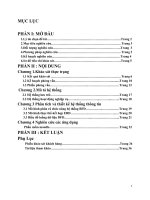Census collection district HỆ THỐNG THÔNG TIN QUẢN LÝ
Bạn đang xem bản rút gọn của tài liệu. Xem và tải ngay bản đầy đủ của tài liệu tại đây (20.91 KB, 1 trang )
Census Collection District (CD)
CDs are designed for use in census years for the collection and dissemination of
Population Census data. In non-census years, CDs are undefined. In aggregate,
CDs cover the whole of Australia without gaps or overlaps.
The CD is the smallest spatial unit in the ASGC. CDs aggregate to form the
larger spatial units of SLAs in the Main, Statistical Region, Statistical District and
LGA Structures, SOS in the SOS Structure, Urban Centres and Localities in the
UC/L Structure and Remoteness Areas in the Remoteness Structure.
Aggregation of SLAs in turn forms the remaining spatial units in the ASGC.
Therefore, in census years, the CD is the common denominator which integrates
all classification structures in the ASGC.
The traditional concept of a CD is that it defines an area that one census
collector can cover, delivering and collecting census forms, in about a ten-day
period. However, in the interests of comparability between censuses, this
criterion is no longer strictly observed. In the 2001 edition, many urban CDs are
of a size such that census collectors may be allocated more than one CD. In
urban areas CDs average about 220 dwellings. In rural areas the number of
dwellings per CD reduces as population densities decrease. By design, CD
boundaries do not cross SLA (and thus LGA) boundaries. Therefore, an
aggregation of CDs covers the administrative area of a local government.









